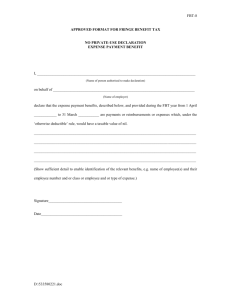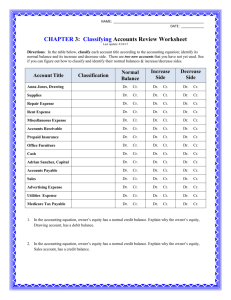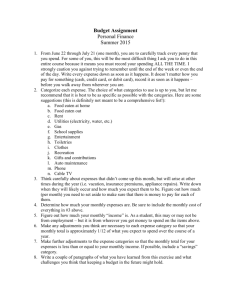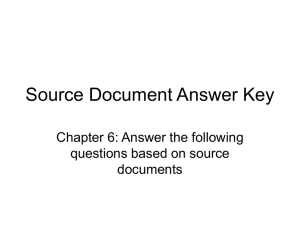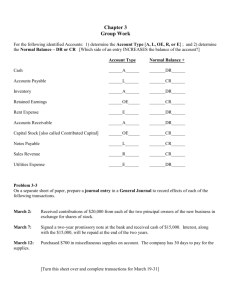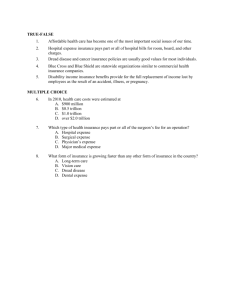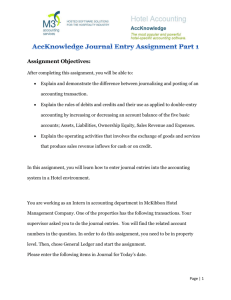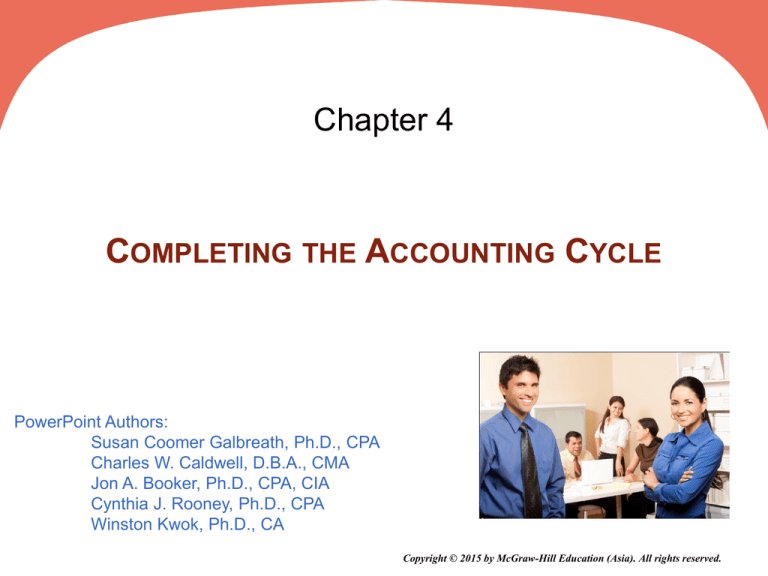
Chapter 4
COMPLETING THE ACCOUNTING CYCLE
PowerPoint Authors:
Susan Coomer Galbreath, Ph.D., CPA
Charles W. Caldwell, D.B.A., CMA
Jon A. Booker, Ph.D., CPA, CIA
Cynthia J. Rooney, Ph.D., CPA
Winston Kwok, Ph.D., CA
Copyright © 2015 by McGraw-Hill Education (Asia). All rights reserved.
4-2
P1
BENEFITS OF A WORK SHEET
Aids the
preparation of
financial
statements.
Reduces
possibility of
errors.
Links accounts
and their
adjustments.
Assists in
planning and
organizing an
audit.
Not a
required
report.
Helps in
preparing
interim financial
statements.
Shows the
effects of
proposed
transactions.
P1
4-3
FastForward
Worksheet
For the Month Ended December 31, 2015
Unadjusted Trial
Balance
Adjustments
Adjusted Trial
Balance
Income
Statement
Statement of
Financial
Position and
Statement of
Changes in
Equity
P1
4-4
FastForward
Worksheet
For the Month Ended December 31, 2015
Unadjusted Trial
Balance
Adjustments
Adjusted Trial
Balance
Income
Statement
Statement of
Financial
Position and
Statement of
Changes in
Equity
P1
4-5
FastForward
Worksheet
For the Month Ended December 31, 2015
Unadjusted Trial
Balance
Adjustments
Adjusted Trial
Balance
Income
Statement
Statement of
Financial
Position and
Statement of
Changes in
Equity
4-6
FastForward
Worksheet
For the Month Ended December 31, 2015
P1
Unadjusted Trial
Balance
Net profit
Adjustments
Adjusted Trial
Balance
Income
Statement
Statement of
Financial
Position and
Statement of
Changes in
Equity
4-7
FastForward
Worksheet
For the Month Ended December 31, 2015
P1
Unadjusted Trial
Balance
Net profit
Adjustments
Adjusted Trial
Balance
Income
Statement
Statement of
Financial
Position and
Statement of
Changes in
Equity
4-8
P1
PREPARING THE FINANCIAL STATEMENTS
4-9
C1
RECORDING CLOSING ENTRIES
1. Resets revenue,
expense and
withdrawal account
balances to zero at
the end of the
period.
2. Helps summarize a
period’s revenues
and expenses in the
Income Summary
account.
Identify accounts
for closing.
Record and post
closing entries.
Prepare post-closing
trial balance.
4 - 10
TEMPORARY AND
C1
PERMANENT ACCOUNTS
Income
Summary
Liabilities
Permanent
Accounts
The closing process
applies only to
temporary accounts.
Owner’s
Capital
Temporary
Accounts
Assets
Withdrawals
Expenses
Revenues
4 - 11
P2
RECORDING CLOSING ENTRIES
Close Credit Balances in
Let’s see how
Revenue Accounts to Income
Summary.
the closing
process works!
Close Debit Balances in Expense
accounts to Income Summary.
Close Income Summary account
to Owner’s Capital.
Close Withdrawals to Owner’s
Capital.
4 - 12
P2
FastForward
Adjusted Trial Balance
December 31, 2015
Debit
Cash
$
4,350
Accounts receivable
1,800
Supplies
8,670
Prepaid insurance
2,300
Equipment
26,000
Accumulated depreciation-Equip.
Accounts payable
Salaries payable
Unearned consulting revenue
C. Taylor, Capital
C. Taylor, Withdrawals
200
Consulting revenue
Rental revenue
Depreciation expense-Equipment
375
Salaries expense
1,610
Insurance expense
100
Rent expense
1,000
Supplies expense
1,050
Utilities expense
230
Totals
$
47,685
Credit
$
375
6,200
210
2,750
30,000
7,850
300
$
47,685
Using the
adjusted trial
balance, let’s
prepare the
closing
entries for
FastForward.
4 - 13
P2
FastForward
Adjusted Trial Balance
December 31, 2015
Debit
Cash
$
4,350
Accounts receivable
1,800
Supplies
8,670
Prepaid insurance
2,300
Equipment
26,000
Accumulated depreciation-Equip.
Accounts payable
Salaries payable
Unearned consulting revenue
C. Taylor, Capital
C. Taylor, Withdrawals
200
Consulting revenue
Rental revenue
Depreciation expense-Equipment
375
Salaries expense
1,610
Insurance expense
100
Rent expense
1,000
Supplies expense
1,050
Utilities expense
230
Totals
$
47,685
Credit
$
375
6,200
210
2,750
30,000
7,850
300
$
47,685
1. Close Credit
Balances in
Revenue
Accounts to
Income
Summary.
4 - 14
P2
CLOSE CREDIT BALANCES IN
REVENUE ACCOUNTS TO INCOME SUMMARY
Dr.
Dec. 31
Consulting revenue
Rental revenue
Income summary
Cr.
7,850
300
8,150
Now, let’s look at the ledger accounts after
posting this closing entry.
4 - 15
P2
CLOSE CREDIT BALANCES IN
REVENUE ACCOUNTS TO INCOME SUMMARY
Consulting Revenue
7,850
7,850
Income Summary
8,150
Rental Revenue
300
300
-
4 - 16
P2
FastForward
Adjusted Trial Balance
December 31, 2015
Debit
Cash
$
4,350
Accounts receivable
1,800
Supplies
8,670
Prepaid insurance
2,300
Equipment
26,000
Accumulated depreciation-Equip.
Accounts payable
Salaries payable
Unearned consulting revenue
C. Taylor, Capital
C. Taylor, Withdrawals
200
Consulting revenue
Rental revenue
Depreciation expense-Equipment
375
Salaries expense
1,610
Insurance expense
100
Rent expense
1,000
Supplies expense
1,050
Utilities expense
230
Totals
$
47,685
Credit
$
375
6,200
210
2,750
30,000
7,850
300
$
47,685
2. Close Debit
Balances in
Expense Accounts
to Income
Summary.
4 - 17
P2
CLOSE DEBIT BALANCES IN EXPENSE
ACCOUNTS TO INCOME SUMMARY
Dec. 31 Income summary
Depreciation expense-Equipment
Salaries expense
Insurance expense
Rent expense
Supplies expense
Utilities expense
Dr.
4,365
Cr.
375
1,610
100
1,000
1,050
230
Now, let’s look at the ledger accounts
after posting this closing entry.
4 - 18
P2
CLOSE DEBIT BALANCES IN EXPENSE
ACCOUNTS TO INCOME SUMMARY
Depreciation
Expense- Eq.
375
375
-
Rent Expense
1,000
1,000
-
Salaries Expense
1,610
1,610
-
Supplies Expense
1,050
1,050
-
Insurance Expense
100
100
-
Utilities Expense
230
230
-
Income Summary
4,365
8,150
3,785
Net Profit
4 - 19
P2
FastForward
Adjusted Trial Balance
December 31, 2015
Debit
Cash
$
4,350
Accounts receivable
1,800
Supplies
8,670
Prepaid insurance
2,300
Equipment
26,000
Accumulated depreciation-Equip.
Accounts payable
Salaries payable
Unearned consulting revenue
C. Taylor, Capital
C. Taylor, Withdrawals
200
Consulting revenue
Rental revenue
Depreciation expense-Equipment
375
Salaries expense
1,610
Insurance expense
100
Rent expense
1,000
Supplies expense
1,050
Utilities expense
230
Totals
$
47,685
Credit
$
375
6,200
210
2,750
30,000
7,850
300
$
47,685
3. Close Income
Summary to
Owner’s Capital.
4 - 20
P2
CLOSE INCOME SUMMARY
TO OWNER’S CAPITAL
Dec. 31 Income summary
C. Taylor, Capital
Dr.
3,785
Cr.
3,785
Now, let’s look at the ledger accounts
after posting this closing entry.
4 - 21
P2
CLOSE INCOME SUMMARY
TO OWNER’S CAPITAL
C. Taylor, Capital
30,000
3,785
33,785
Income Summary
4,365
8,150
3,785
-
4 - 22
P2
FastForward
Adjusted Trial Balance
December 31, 2015
Debit
Cash
$
4,350
Accounts receivable
1,800
Supplies
8,670
Prepaid insurance
2,300
Equipment
26,000
Accumulated depreciation-Equip.
Accounts payable
Salaries payable
Unearned consulting revenue
C. Taylor, Capital
C. Taylor, Withdrawals
200
Consulting revenue
Rental revenue
Depreciation expense-Equipment
375
Salaries expense
1,610
Insurance expense
100
Rent expense
1,000
Supplies expense
1,050
Utilities expense
230
Totals
$
47,685
Credit
$
375
6,200
210
2,750
30,000
7,850
300
$
47,685
4. Close
Withdrawals
Account to
Owner’s
Capital.
4 - 23
P2
CLOSE WITHDRAWALS ACCOUNT
TO OWNER’S CAPITAL
Dec. 31 C. Taylor, Capital
C. Taylor, Withdrawals
Dr.
200
Now, let’s look at the ledger accounts
after posting this closing entry.
Cr.
200
4 - 24
P2
CLOSE WITHDRAWALS ACCOUNT
TO OWNER’S CAPITAL
C. Taylor,
Withdrawals
200
200
-
C. Taylor, Capital
200
30,000
3,785
33,585
4 - 25
SUMMARY OF THE CLOSING PROCESS
1. Close Credit Balances in Revenue Accounts
to Income Summary.
2. Close Debit Balances in Expense Accounts to
Income Summary.
3. Close Income Summary to Owner’s Capital.
4. Close Withdrawals Account to Owner’s
Capital.
4 - 26
P3
POST-CLOSING TRIAL BALANCE
List
of permanent accounts and
their balances after posting
closing entries.
Total
debits and credits must be
equal.
4 - 27
P3
POST-CLOSING TRIAL BALANCE
FastForward
Post-Closing Trial Balance
December 31, 2015
Debit
Credit
Cash
$
4,350
Accounts receivable
1,800
Supplies
8,670
Prepaid insurance
2,300
Equipment
26,000
Accumulated depreciation-Equip.
$
375
Accounts payable
6,200
Salaries payable
210
Unearned consulting revenue
2,750
C. Taylor, Capital
33,585
C. Taylor, Withdrawals
Consulting revenue
Rental revenue
Depreciation expense-Equipment
Salaries expense
Insurance expense
Rent expense
Supplies expense
Utilities expense
Totals
$
43,120 $
43,120
4 - 28
C2
ACCOUNTING CYCLE
4 - 29
C3
CLASSIFIED STATEMENT OF FINANCIAL POSITION
Categories of a Classified Statement of Financial Position
Assets
Liabilities and Equity
Current assets
Current liabilities
Noncurrent assets
Noncurrent liabilities
Long-term financial assets Equity
Property, plant and equipment
Intangible assets
Current items are those expected to come due (both
collected and owed) within the longer of one year or the
company’s normal operating cycle.
4 - 30
C3
Current assets are expected to be sold,
collected, or used within one year or the
company’s operating cycle.
4 - 31
C3
Long-term financial assets or investments are
expected to be held for more than one year or
the operating cycle.
4 - 32
C3
Property, plant and equipment are tangible
long-term assets used to produce or sell
products and services.
4 - 33
C3
Intangible assets are long-term resources
used to produce or sell products and services
and that lack physical form.
4 - 34
C3
Current liabilities are obligations due within the
longer of one year or the company’s operating
cycle.
4 - 35
C3
Noncurrent liabilities are obligations not due
within the longer of one year or the company’s
operating cycle.
4 - 36
C3
Equity is the owner’s claim on the assets.
4 - 37
A1
CURRENT RATIO
Helps assess the company’s ability to pay
its debts in the near future
Current Ratio =
Current Assets
Current Liabilities
Nestlé
4 - 38
P4
4A – REVERSING ENTRIES
Reversing entries are optional. They are recorded in
response to accrued assets and accrued liabilities that were
created by adjusting entries at the end of a reporting period.
The purpose of reversing entries is to simplify a company’s
recordkeeping.
Let’s see how the accounting for our payroll
accrual will be handled with and without
reversing entries.
4 - 39
P4
4 - 40
P4
Without Reversing Entries
With Reversing Entries
4 - 41
END OF CHAPTER 4


